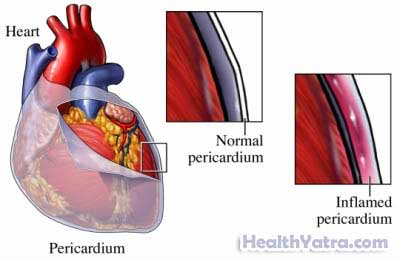تعريف
Pericarditis is irritation and swelling of the pericardium, which is the thin sac that surrounds the heart. Extra fluid that builds up between the two layers of the pericardium restricts the heart’s action.

أسباب
The cause of pericarditis is often unknown. However, possible causes include:
- Viral, bacterial, or fungal infection
- نوبة قلبية
- Inflammatory diseases such as rheumatoid arthritis or lupus
- Cancer that has spread from a tumor near the heart
- فشل كلوي
- Injury or surgery affecting the chest, esophagus, or heart
- العلاج الإشعاعي
- Certain medications used to suppress the immune system
عوامل الخطر
Factors that increase your chance of getting pericarditis include:
- A weakened immune system that is not able to fight off infections and other diseases
- Any of the causes listed above
الأعراض
Chest pain is a common symptom of pericarditis, especially over the left side or center of the chest. It sometimes spreads to the neck and left shoulder. It is usually a sharp, stabbing pain. Deep breathing or lying down may worsen the pain. Sitting up may lessen it. Other symptoms may include:
- ضيق في التنفس
- يسعل
- حمى وقشعريرة
- Pain when swallowing
- Weakness and fatigue
التشخيص
The doctor will ask about your symptoms and medical history. A physical exam will be done. A stethoscope will be used to listen for a grating or rubbing sound in your heart. If the condition is severe, there may be a crackle sound in your lungs. The following tests may be performed:
Images of your heart may need to be taken. This can be done with:
- الأشعة السينية الصدر
- Electrocardiograph (ECG or EKG)
- مخطط صدى القلب
- Heart or chest MRI or CT scan
Your bodily fluid may need to be tested. This can be done with:
- تحاليل الدم
- بزل التامور
العلاج
Treating pericarditis depends on the cause, if the cause is known. In many cases, when the cause is unknown or viral pericarditis is suspected, pain relievers and anti-inflammatory medications are given. In other cases, corticosteroids may be given. If the condition is caused by a bacterial infection, antibiotics are used.
If the fluid is seriously affecting the heart’s ability to pump, the fluid may need to be removed through pericardiocentesis, which is the same procedure used for testing. In rare cases, surgery may be performed.
Depending on the cause of the pericarditis, the illness can range from mild to life-threatening. Acute inflammatory pericarditis usually subsides with treatment within a few weeks or months. However, pericarditis caused by chronic inflammatory diseases, like lupus or rheumatoid arthritis, may last longer or tend to recur.
If you are diagnosed with pericarditis, follow your doctor’s instructions .
الوقاية
There is no known way to prevent pericarditis.
